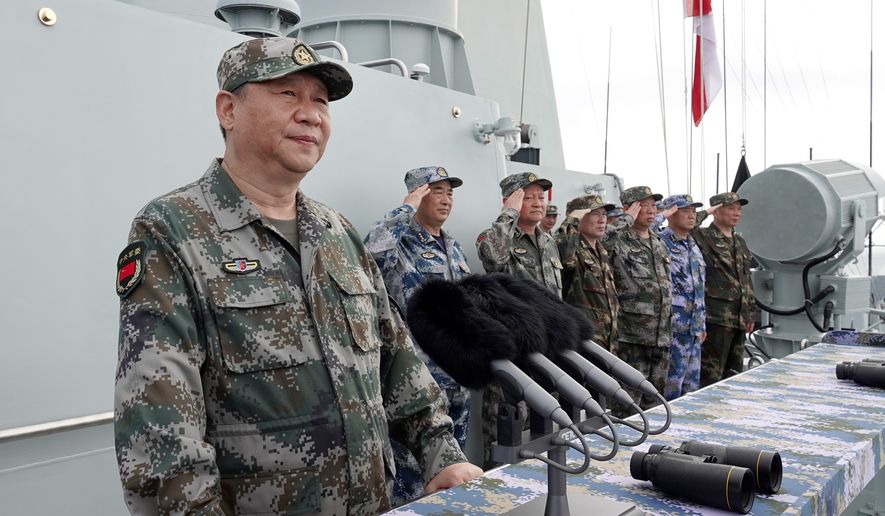China’s military is unlike traditional armies charged with defending national sovereignty and instead is tasked with backing the Chinese Communist Party, according to a new U.S. military assessment.
Under the Chinese legal system, Chinese Communist Party (CCP) leaders have overall command of the military through the Central Military Commission, headed by President Xi Jinping. Mr. Xi has been expanding the role of the People’s Liberation Army (PLA) in the political system beyond preserving territorial sovereignty and maintaining internal control.
“At its core, the PLA views itself as an armed wing of the CCP,” the report compiled by the U.S. Pacific Air Forces concludes.
“Increasing national power, Chinese nationalism and a shifting geopolitical landscape allow the PLA, driven by the CCP, to move unchecked into missions that advance the CCP’s goals of national rejuvenation and the so-called ‘China Dream,’ ” the report states. “Aggressive military modernization, the One Belt, One Road initiative, and violations of international norms in the South China Sea are meant to increase China’s global footprint.”
The report was published in the current edition of the Hawaii-based Pacific Air Forces monthly newsletter, The State of the Game.
The PLA is similar to the Soviet Union’s military in that allegiance to the party is maintained through political commissars who are separate from the chain of command.
“These quasi-commanders ensure that tactical and operational decisions are in accordance with the CCP’s strategic interests and objectives,” the report said.
Outside the PLA, poorly structured inter-government coordination has allowed the Chinese military to wield substantial influence in driving a military-oriented policymaking agenda, the report states. A key element of that agenda is preserving the rule of the CCP through enforcing both territorial sovereignty and internal security against perceived threats to the regime.
The report said that understanding the dynamics of how the PLA views itself provides insights into the strategic motives and objective of the ruling party. One section of the report noted how PLA troops were used in June 1989 to suppress the mass political protests in Beijing’s Tiananmen Square.
“When civilians refused to leave the square, a PLA soldier opened fire indiscriminately,” the report said. “Shocked Beijingers began to clash with troops throughout the city and were met with varying levels of resistance from the PLA.”
According to the report, leaders were surprised to learn during the attacks that some PLA units refused to readily attack Chinese citizens.
The PLA’s leadership “believes that in the initial stages of the 1989 crisis, soldiers from Beijing serving in the city were unwilling to fire on their neighbors,” the report said. “The later crackdown was facilitated by bringing in troops from other provinces and regions outside the city who didn’t identify so closely with the protesters.”
Since the 1989 crisis, the PLA has prohibited enlisted troops from serving in their regions of origin in a bid to prevent future disloyalty during operations to put down mass protests.
The Air Force report also included a section on the 100th anniversary of the founding of the CCP last month that included a threatening speech by Mr. Xi. The Chinese leader stated that “Chinese people would not be bullied, oppressed, or enslaved by foreign powers,” and noted that “any attempts to do so, would result in a collision with a ’Great Wall’ of 1.4 billion Chinese people.”
According to the report, the statement included a Chinese figure of speech that can mean “total failure” to express the full impact of the collision.
“Breaking the idiom into its individual parts yields a literal translation of ‘head bashed, blood flowing,’ ” the report said. “Though the phrase originates from a well-known Chinese children’s story called ‘Journey to the West,’ and is familiar to native Chinese speakers, the context is not well known outside of China.”
The speech was part of efforts to stir nationalism in China and serve as a warning to the world, especially those that have criticized Beijing’s human rights abuses in western China, the crackdown on democracy in Hong Kong and critics of unfair trade practices.
“In response, Twitter has exploded with debate among Chinese and outside observers examining the underlying motivations for using such a phrase to express China’s newfound assertiveness,” the report said.
• Bill Gertz can be reached at bgertz@washingtontimes.com.




Please read our comment policy before commenting.